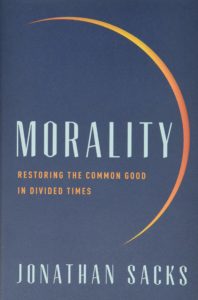The Role of "We" Versus the Role of "I"
By Arnold Kling


- All countries and cultures have three basic institutions. There is the economy, which is about the creation and distribution of wealth. There is the state, which is about the legitimization and distribution of power. And there is the moral system, which is the voice of society within the self; the “We” within the “I”….
- —Jonathan Sacks, Morality: Restoring the Common Good in Divided Times, p. 111
Rabbi Lord Jonathan Sacks died in November of 2020. Earlier that year, he published Morality, in which he sermonizes about the harms caused by an increase in selfishness. His long standing interest in philosophy, economics, and political theory results in a book that echoes others I have reviewed here, especially Raghuram Rajan’s The Third Pillar2 (which Sacks cites) and Yuval Levin’s The Fractured Republic.3
Sacks writes,
- What has happened in the past half-century has been precisely what de Tocqueville feared. It took a long time to appear, precisely because of the strength of the institutions on which he discerned American democratic freedom to rest: religion, community, family, and the sense of the nation as a moral community. As these eroded from the 1960s onward, individualism was left as the order of the day… The “I” prevails over the “We.” We have the market and the state, the two arenas of competition, one for wealth, the other for power, but nothing else, no arena of cooperation that would bridge the differences between the wealthy and powerful and the poor and powerless. (262)
Sacks sees increased individual freedom as coming with costs as well as benefits.
- We are free as never before to be as we wish and live as we choose… We can do things of which our ancestors could hardly dream, but what they found simple we find extremely hard. Getting married. Staying married. Being part of a community. Having a strong sense of identity. Feeling continuity with the past before we were born and the future after we are no longer here. More of us live alone, and loneliness means increased risk of chronic disease, dementia, and mortality rates. (32-33)
Sacks correlates this increased loneliness with increased reliance on both the market and the state. He argues that we have outsourced too much to both.
Sacks sounds like a progressive when he criticizes corporations for their exclusive focus on profits and criticizes the market for producing great inequality of wealth. On the other hand, he sounds like a classical liberal when he speaks up for free speech.
- But resist with all your heart any attempt to substitute power for truth. And stay far away from people, movements, and parties that demonize their opponents. (194)
He also decries the culture of victimhood and the return of public shaming.
Sacks argues that humans have higher needs than just material wants. Citing Jerome Bruner, Sacks contrasts thinking in empiricist mode with thinking in story mode.
- One is logical argument, the other is telling a story. The word “then” means something different in the two cases. “If X then Y” is not the same kind of connection as “The king died, then the queen died.” The first is a timeless proposition, while the second is intrinsically set in time…
- Narrative is how we construct meaning out of the flow of events, and the fact that it does not have simple criteria of verification or refutation, the way science does, does not mean that it is mere fiction. On the contrary, storytelling is the essence of who we are as meaning-seeking animals. (246)
But while we have criteria for evaluating what is a good scientific statement, Sacks does not directly address the issue of how to tell a good story from a bad one. Today, many fewer people in the West are attracted to the stories of traditional religions. But some of the stories to which many have turned, such as those described by James Lindsay and Helen Pluckrose in Cynical Theories, strike me as much worse.4
In a chapter entitled “Which Morality?” Sacks asks the question but seems to shy away from answering it.
- To become moral, we have to make a commitment to some moral community and code. We have to make a choice to forego certain choices. We have to choose the right restraints. And having fallen in love with some moral principle or ethical ideal, we have to build a structure of behavior around it for the moment when love falters. (274)
In conclusion,
- Out of the many moralities available, there is one that is ours, and we do not have to denigrate the others to make that one our own. ( 275)
Sacks exhorts us to return from “I” to “We.” He says that this means going beyond contracts to covenants. We sign contracts out of self-interest.
- A covenant generates a different type of relationship altogether. Recall that what makes it different is that in a covenant, two or more individuals, each respecting the dignity and integrity of the other, come together in a bond of love and trust, to share their interests, sometimes even to share their lives, by pledging faithfulness to one another, to do together what neither can achieve alone. (313)
From my perspective, Sacks’ sermons suffer from a failure to distinguish the realm of the small community from the realm of the larger society. Although he cites Ferdinand Tonnies on the difference between Gemeinschaft and Gesellschaft, Sachs sometimes seems to want a large-scale society to have the characteristics of a small community.
In my view, small units of society, including families and small work groups, function best informally. You do not want to use market prices to run your family. You do not want to write down formal laws to manage a small work group. Personal relationships and tacit understandings form a better basis for small-scale cooperation.
As the scale of cooperation increases, particularly as it goes beyond the Dunbar number of about 150 individuals, informality must give way to written rules, well-defined roles and responsibilities, and market competition.
What Sacks celebrates as the “We” seems to me most relevant to small-scale social units. On the other hand, we must be very careful about invoking “We” on a large scale. More often than not, those who speak of “We” in the context of large-scale societies end up expanding government power while rarely achieving the ends that they have proclaimed. If there are to be many moral codes, as Sacks would allow, then the state needs to stand aside and let small communities choose for themselves.
I think that the problems of loneliness and loss of meaning that Sacks identifies are due to a breakdown of covenants at a small-scale level. I wish that families were larger and stronger. I wish that neighborhoods had more continuity. I wish that the school environment for children could be informal rather than bureaucratic. I wish that long-term friendships were more prevalent.
Alexis de Tocqueville in the Online Library of Liberty; and the EconTalk podcast episode Yuval Levin on The Fractured Republic. See also “Camping-Trip Economics vs. Woolen-Coat Economics,” by Arnold Kling, Library of Economics and Liberty, Feb. 2, 2015.
But at the macro level, I think we are better off with a society of contract than with a society of covenant. The more weight we place on “We” at the national level, the less room for the sort of community that I would like to see at a local level. As we think in terms of larger scale, I think it helps to lose the “We.”
Footnotes
[1] Jonathan Sacks, Morality: Restoring the Common Good in Divided Times.
[2] See “Contemporary Society’s Crumbling Pillar,” by Arnold Kling. Econlib, Apr. 1, 2019.
[3] See “The Conservative Way Forward?” by Arnold Kling. Econlib, Apr. 4, 2016.
[4] “Liberalism and Its Enemies: Pluckrose and Lindsay,” by Arnold Kling. Econlib, Oct. 5, 2020.
*Arnold Kling has a Ph.D. in economics from the Massachusetts Institute of Technology. He is the author of several books, including Crisis of Abundance: Rethinking How We Pay for Health Care; Invisible Wealth: The Hidden Story of How Markets Work; Unchecked and Unbalanced: How the Discrepancy Between Knowledge and Power Caused the Financial Crisis and Threatens Democracy; and Specialization and Trade: A Re-introduction to Economics. He contributed to EconLog from January 2003 through August 2012.
Read more of what Arnold Kling’s been reading. For more book reviews and articles by Arnold Kling, see the Archive.
